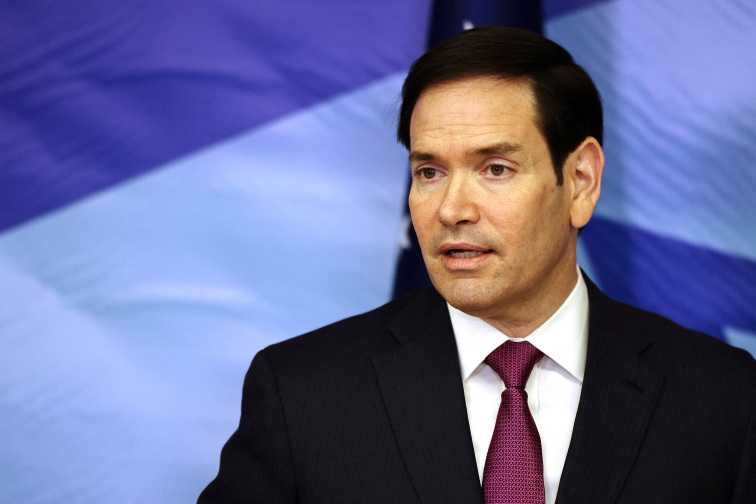On March 5, 2025, PLA delegates arrive at the Great Hall of the People in Beijing to attend the opening of the National People's Congress. (Photo by Kevin Frayer/Getty Images)
[People news] The personnel changes resulting from this year's Fourth Plenary Session have left many observers disappointed. The atmosphere at the venue was unusually dull, with no dramatic scenes of factions clashing as had been speculated before and during the meeting. Independent scholar and columnist Wu Zuolai (Wu Zuo Lai) published an article on October 29 in Taiwan's Central Radio Station (RTI), noting that the Fourth Plenary Session represents a compromise among the military, the elders, and Xi Jinping, with 'stability first' being the prevailing consensus within the party. Consequently, no faction launched an attack against the other during the session.
The article begins by explaining that the announcement of the timing for the Fourth Plenary Session was possible because the military, the elders, and Xi Jinping had reached a consensus, which included the early appointment of Zhang Shengmin (Zhang Sheng Min) as Vice Chairman of the Central Military Commission.
It further emphasises that the outcome of the Fourth Plenary Session is a result of compromise among all parties, with 'stability first' being the shared understanding within the party.
At present, the Chinese Communist Party (CCP) is grappling with significant challenges, including maintaining stability, a severe economic crisis, a social crisis, and trade agreements, all of which are crucial to the stability of the CCP regime.
The article suggests that under these circumstances, the tensions between General Zhang Youxia (Zhang You Xia) of the military and Xi Jinping must be temporarily set aside, with a compromise that will be addressed collectively at the 21st National Congress. Thus, the outcome of the Fourth Plenary Session was inevitable.
'No faction possesses the power to achieve a complete victory, nor does any faction dare to overturn the table,' the article concludes, asserting that this Fourth Plenary Session cannot be characterised as united, nor can it be deemed a victory.
The article highlights that two extreme scenarios did not materialise during the Fourth Plenary Session: first, there was no joint military proposal to remove Xi Jinping from his role as Chairman of the Central Military Commission. This 'quasi-coup' news emerged during the session, revealed by former naval officer Yao Cheng on an online platform. The author suggests that this may indicate the Chinese Communist Party's military is at a disadvantage in internal power struggles, leading them to release damaging information about Xi Jinping through overseas media to create a deterrent effect.
Secondly, the plenary session led by Xi Jinping did not approve a decision regarding the handling of nine generals, eight of whom are members of the Central Committee. Prior to the Fourth Plenary Session, the military took the initiative by having the Ministry of Defence announce the handling decision for these generals in the name of the Central Committee and the Central Military Commission, which was subsequently voted on and approved by the plenary session. The article argues that the military achieved its objectives through this palace coup strategy. Since these nine generals are all trusted allies rapidly promoted by Xi Jinping, this situation not only represents a significant loss of face and political authority for him but also suggests that he has lost his standing within the military.
The article further states that starting in 2024, the Chinese economy is expected to plunge deeper into crisis, with the population issue compounding the challenges. Additionally, the aggressive 'wolf warrior' diplomacy, coupled with trade wars, has resulted in stability maintenance expenditures surpassing military budgets, while social discontent simmers like a volcano, with widespread dissatisfaction expressed online. The military is facing even more serious issues, including investigations into numerous corrupt generals and growing tensions and fractures between the military and the Party Central Committee, with many rumours being confirmed one after another.
The article asserts that the Fourth Plenary Session failed to reflect on this issue and did not hold the highest leader accountable for his erroneous decisions. Xi Jinping's refusal to acknowledge mistakes is driven by a fear of accountability; should he be held accountable, he risks being ousted.
In conclusion, the author presents the following assessments.
1. The party and government system remains firmly under the control of Xi Jinping's faction. However, the newly appointed Minister of Organisation, Shi Taifeng, has begun to organise personnel for the upcoming 21st National Congress. He has disrupted the Xi faction's dominance, which has persisted for over a decade, by adopting a principle of recruiting talent from across the nation.
2. The Chinese economy is unlikely to escape the quagmire of economic crisis in the next decade or even longer.
3. The relationship between Xi Jinping's central leadership and the military, led by Zhang Youxia, has soured, resulting in a detrimental power balance. This conflict is irreconcilable and will ultimately need to be addressed before the 21st National Congress.
4. It remains to be seen whether the central decision-making and deliberation bodies are functioning effectively.
5. It is now a fact that Xi Jinping has experienced a decentralisation of power over the past year, and his personal propaganda has been downgraded.
6. The senior leadership of the Communist Party is fully aware that it faces insurmountable challenges across various domains, from domestic affairs to foreign relations, and from trade to public welfare. The potential impact of these challenges and the risk of social unrest are uncertain; they no longer possess the 'three confidences.'
△









News magazine bootstrap themes!
I like this themes, fast loading and look profesional
Thank you Carlos!
You're welcome!
Please support me with give positive rating!
Yes Sure!